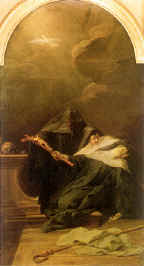THE VISIT

Memorial of St. Scholastica, Virgin
Lk 10:38-42
St. Scholastica, a sister of St. Benedict of Nursia, lived from 480 through 547. She was the first Benedictine nun. Today the liturgy venerates her blessed memory.
Despite her being a household name among Catholic families, there are only a few anecdotes we know about St. Scholastica. One is about her brother’s annual visit with her. Another is about how her brother came to know her death.
Scholastica always loved to listen to her brother’s wisdom. But her brother, Benedict, would visit her only annually. In one of Benedict’s visit with her, Scholastica prayed very hard that a storm would force her brother to stay longer. And indeed, a storm came and Benedict was able to return to the monastery only when it subsided.
Three days after that stormy visit, Scholastica passed away. Benedict, who was then at prayer, came to know about his saintly sister’s death through a dove that flew to heaven.
I am sure, Benedict was thankful for the storm that delayed his coming home the last time he visited his sister. During the storm, he did not know that Scholastica would die three days later. At her death, Benedict realized how that storm was really grace.
The Gospel today tells us the story of another visit. Jesus visits Martha and Mary, sisters of Lazarus. Certainly, both women are very happy to welcome Jesus in their home. Each has a way of showing that. One is up on her feet; the other is seated at the feet of Jesus. But both are very busy: Martha with the details of hospitality while Mary with listening to Jesus.
Unlike Benedict’s last visit to his sister, Scholastica, there is no storm, but there is something boiling inside the house today. Martha complains about Mary leaving her to do alone the serving. Jesus teaches her a very important lesson. He visits them to meet them not to check on what they have at home. He visits them to be with them not to see what food they have or what kind of furniture they keep. He visits them to talk and listen to them; the rest is secondary.
When someone visits us, let us be represent to him. Let us appreciate every visit we receive. Should a storm still teach us that? What if we see a dove fly to heaven after someone’s visit, would we be grateful or regretful?
Lk 10:38-42
St. Scholastica, a sister of St. Benedict of Nursia, lived from 480 through 547. She was the first Benedictine nun. Today the liturgy venerates her blessed memory.
Despite her being a household name among Catholic families, there are only a few anecdotes we know about St. Scholastica. One is about her brother’s annual visit with her. Another is about how her brother came to know her death.
Scholastica always loved to listen to her brother’s wisdom. But her brother, Benedict, would visit her only annually. In one of Benedict’s visit with her, Scholastica prayed very hard that a storm would force her brother to stay longer. And indeed, a storm came and Benedict was able to return to the monastery only when it subsided.
Three days after that stormy visit, Scholastica passed away. Benedict, who was then at prayer, came to know about his saintly sister’s death through a dove that flew to heaven.
I am sure, Benedict was thankful for the storm that delayed his coming home the last time he visited his sister. During the storm, he did not know that Scholastica would die three days later. At her death, Benedict realized how that storm was really grace.
The Gospel today tells us the story of another visit. Jesus visits Martha and Mary, sisters of Lazarus. Certainly, both women are very happy to welcome Jesus in their home. Each has a way of showing that. One is up on her feet; the other is seated at the feet of Jesus. But both are very busy: Martha with the details of hospitality while Mary with listening to Jesus.
Unlike Benedict’s last visit to his sister, Scholastica, there is no storm, but there is something boiling inside the house today. Martha complains about Mary leaving her to do alone the serving. Jesus teaches her a very important lesson. He visits them to meet them not to check on what they have at home. He visits them to be with them not to see what food they have or what kind of furniture they keep. He visits them to talk and listen to them; the rest is secondary.
When someone visits us, let us be represent to him. Let us appreciate every visit we receive. Should a storm still teach us that? What if we see a dove fly to heaven after someone’s visit, would we be grateful or regretful?


0 Comments:
Post a Comment
Subscribe to Post Comments [Atom]
<< Home